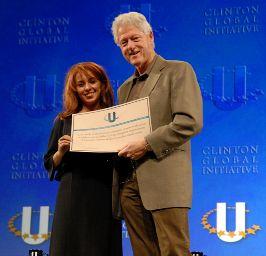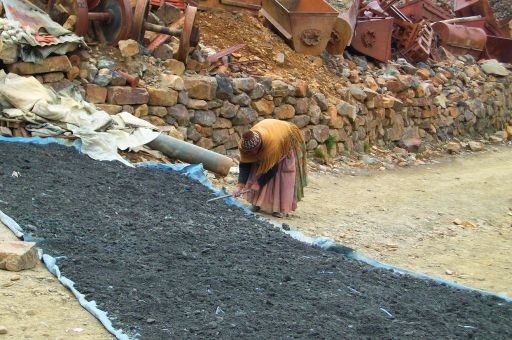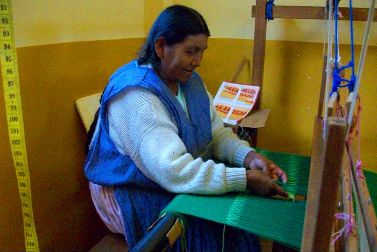Empowering Impoverished Women in Mining Communities of Bolivia through education, information and training, is a project created to address one of the most important global challenges: poverty alleviation.
Interweaving elements of her heritage and her University of St. Thomas (Houston, TX) education, Ximena Murillo developed an internationally, award-winning humanitarian project: Empowering Women in Mining Communities of Bolivia.
Her grandfather, Gabriel Vera, was the first mining engineer in Potosi-Bolivia by 1930’s and she grew up travelling every year with her mother, Josefina Vera-Murillo, a teacher, to Bolivian mining villages to teach the miners and their families how to read and write in Spanish. Years later, her mother published “Hacia Mi Porvenir”, a book addressed specifically to literate people from these communities and which today, will be used at every mining community center. Ximena, as well as her sisters, Carla Murillo, MBA, director of the main local partner, ODPS–Bolivia and Sonia Murillo, MD-Pediatrician, whose clinic sponsors medical supplies for children in these communities, continues this legacy of community service with this project.
Ximena Murillo graduated from the Catholic University of Bolivia and then pursued a Master in International Business at the University of St. Thomas. Her working experience involves private, non-profit and international government organizations, including USAID, United Nations Association, Houston Chapter, Texas-Interfaith Inc. and she is the CEO and co-founder of United4Change, Center for International Development & Global Citizenship.
Murillo’s humanitarian efforts were internationally recognized at the Clinton Global Initiative University (CGI U) meeting at the University of Texas in Austin in February 2009. Out of thousands of projects submitted, Murillo’s was one of 13 to be featured at this meeting and acknowledged by Former President Bill Clinton. She was also invited to participate at the press conference with him. The program has received the CGI U Outstanding Commitment Award, a grant supported by the Pat Tillman Foundation.
Here's what President Clinton
had to say about this initiative:

From President Bill Clinton
At the Clinton Global Initiative University Press Conference
Austin, TX – February 14, 2009
“A lot of you know a lot about South American politics. Evo Morales, the current President of Bolivia, was elected as the first Native Indian to be President of his country, in a country that has the lowest per capita income in Latin America. Because he said the natural wealth of the country had been exploited and taken away by international companies that didn’t offer any corresponding benefits.
But we are going to have devastation in these mining communities unless we now have a system where there is a simultaneous commitment to developing health care, education, and the economic diversification necessary to leave these communities better off when the mines play out than they are when the mines are going on…
This is a huge, huge deal that also will become increasingly important in places like Indonesia and West Africa where there are gold, copper and other mines. This is going to become a global issue. So what Ximena has done here is important not only to the people of Bolivia and not only on moral and ethical principals. A lot of these communities have been ripped off for decades. Even if they pay people a decent wage, when the mines played out, the mining companies said, “Thank you very much. We’re out of here.” And so what she is doing will mean that, when the mines play out, the music will play on for the people living there if they have a diversified economy and an educated people.
This is an example of what happens here, and these individuals are great. I want to thank them all.”
Background
With a population of about 9,119,152 (July 2007 estimate) and a GDP of $ 17.413 billion (2008 estimate), Bolivia is considered one of the poorest countries in South America. Although Bolivia has been very rich in natural resources, its political instability has not allowed a sustainable economic growth to be achieved. For that reason, this country has often been referred to a “donkey sitting on a gold mine”.
The inequality in education and health among the various groups in Bolvia is striking. The gaps in child mortality and malnutrition are wider in Bolivia than in other Latin American countries. Disparities in literacy rates between urban and rural residents are vast. These inequalities suggest Bolivia's failure to ensure equal enjoyment of all people to economic, social and cultural rights.
Bolivia, the fourth-largest tin producer, has traditionally been a mining country—mining was the country's top industry—producing antimony, bismuth, copper, gold, lead, silver, tungsten, and zinc. It had large reserves of gold, lithium, iron ore, natural gas, and petroleum. Mining was one of the main sources of income in Bolivia during the 1940s when minerals, mainly tin, silver and tungsten, constituted more than 70% of its total exports.
The 1952 Bolivian Revolution nationalized most of the mines, which were predominantly owned by 3 men, commonly known as the “Tin Magnates”. This then led to the establishment of a state mining agency, Corporacion Minera Boliviana (COMIBOL). In the 1980s, COMIBOL was responsible for almost two-thirds of Bolivia's mining output. However, by the late 1980s, Bolivia had slowly begun to capitalize on and privatize mining which ultimately led to COMIBOL's share of mineral production reducing to less than 30 percent by the mid 1990’s. COMIBOL's bloated work-force, which had reached about 30,000 in 1984, was reduced to fewer than 3,000.
At around the same time, joint ventures between COMIBOL and private concerns started to come into existence. By 1997, COMIBOL produced 30.6 percent of the declining tin production and only 4.3 percent of the increasing zinc production. All other mineral production was being undertaken by private enterprise.
The Bolivian economy came crashing down after a dramatic fall in the price of tin and other minerals during the 1980s. Today, even though minerals constitute a smaller part of Bolivia’s exports, some mineral production like gold, zinc, lead, tin, antimony, silver, iron, copper and ulexite (a white crystalline mineral) still continues. El Mutun, for example, a 40,000 metric ton deposit located close to the Brazilian border, is considered one of the largest in the world.

There are approximately 50 mining communities in Bolivia and about 80,000 Bolivians still depend on mining for their livelihood. They live below the poverty line and have limited and, in some cases, no access to education, information or training.
In relation to education, approximately 85% of the total rural population in Bolivia is illiterate and is one of the main reasons for the ongoing poverty and low socioeconomic development in this Country. This problem is certainly more pronounced in mining the communities. Few people have the opportunity to go to school owing to different mobility reasons.
In some communities, children go to primary school but on completion, most of them do not continue on to higher education because the schools are too far or their parents cannot afford it. Children from a single parent home are typically forced to go back to the mines and work alongside their mothers after primary school, searching for mineral scraps in the dumps and rivers.
Today, children are not allowed to go inside the mines but are still exposed to the hazards and dangers that are inherent to mining. Their mothers work excessively long hours under extremely difficult conditions with contaminated water to drink and no protection.
Usually, a woman married to a miner stays at home and takes care of the children. She is called “Ama de Casa” (housewife). A widow who has lost her husband in the mines, been abandoned or is a single mother, has to assume the role of provider for her family and is therefore unable to pursue any educational desires whatsoever. In some mining communities, these women are rarely allowed to work inside the mines because of economic considerations, superstitions and discriminatory regulations. These women have been called "palliris" (hand pickers) or “barranquilleras” and their work involves gathering and hand picking minerals.
Nowadays in some mining communities, women who grew up as “palliris” are also allowed to work inside the mines. Hence, they call themselves “Socias Mineras de Bolivia” (Mining Partners of Bolivia) instead of “palliris”. They pay a fee to become part of the Miners Association (Cooperative) and play an equal role in the decisions making process as well as having a strong influence in all mining activities.
Women in these communities have limited access to information or assistance in relation to health, safety and legal rights concerns that are needed to protect the livelihood of their families and themselves. Whilst the provision of information has greatly improved over the last few years through the creation of, and participation in these mining associations, illiteracy remains as a major barrier to accessing this much needed information.
In addition, women in mining do not have the opportunity to learn alternative skills together with the necessary business acumen that would allow them to pursue entrepreneurial opportunities. This pursuit is further exacerbated by the limited, or in many cases, nonexistent access to micro credit.
Mission
By creating “Community Centers”, women of the mining communities in Bolivia will have a place where they can learn how to read and write, get informed, obtain training and be empowered as entrepreneurs. This Commitment is significant because in addressing the need to escape poverty, other challenges such as education, human rights, child labor and health hazards are also tackled. While supporting local cultures and needs, this Commitment will promote women so that they can take more of a leadership role in advancing the social and economic development of their communities.
This project’s goal is to have fully literate, working and independent women, who will be the leaders of future generations, thus making this project sustainable. By empowering 1,500 women from 10 different impoverished mining communities of Bolivia, they can achieve a better quality of life. These communities are the following: Caracoles Mine, Viloco Mine, Llallagua, Uncia, Coriri, Uyuni, Caquena, Caluyo, Janko Kota. The first Community Center will be established in Caracoles Mine.
Objective
We want to demonstrate that the relationship between women’s education and the socioeconomic development of these poor regions is relevant. In coordination with our partners and sponsors in both Bolivia and the United States, we are offering them a comprehensive program of adult education, different informational workshops about heath, safety awareness and the environment. This will be coupled together with a new training program of design and manufacture of different eco-friendly products, native art and crafts, baking and a series of workshops in the areas of design, commercialization, marketing and sales.
It is important to mention that the objective of this project takes account of their culture and traditions and therefore, fairs and expositions will be organized to help them commercialize their handicrafts and products nationwide and globally.
The first focus area includes literacy courses using an innovative Spanish/Aymara method for adults with “andragogia” techniques. These courses are based on the book “Hacia Mi Porvenir”, a method created 40 years ago that has been especially addressed to people from rural and mining areas.

The second focus area embraces informational workshops and conferences about health, family planning, child care and other issues related to women. All of these courses are designed based on the community environment, their native language and availability. Trainers at these community centers will also teach women about nutrition whilst providing them access to medical evaluations and attention. Campaigns will also be organized with the local Association for waste removal, clean-up of trash cans, pollution prevention and recycling.
The third focus area consists of training courses and workshops to learn different skills such as painting, clothing design of native customs and sewing (textiles, crochet and sew stick). Other talents addressed to strengthen their traditions and beliefs as well as to stimulate their communities’ economic and commercial development will also be developed. This area also includes the design and manufacture of eco-friendly products as reusable shopping bags and other products that helps to reduce plastic bag consumption.
First Community Center, Caracoles Mine
In April of 2009, the President of ODPS and I had the opportunity to travel to Caracoles, one of the most important silver mine in La Paz and Bolivia. This mining community is located in Quime-Inquisivi, 248 kilometers from La Paz. When we arrived in Caracoles, the President of Empresa Minera Cooperativa Central Caracoles, Gregorio Laura, met us and took us to visit the mines. He and his staff showed us the work they do daily as well as sharing their experiences and concerns about the economic challenges they are currently facing.
After COMIBOL left in the 80’s, miners of this community decided to start a private Company called Empresa Minera Cooperativa Central Caracoles. This private organization manages four mining associations: El Nevado, Libertad, Porvenir and Gran Poder del Asiento. They have agreed to sign a contract with COMIBOL for the administration and exploitation of the Pacuni Mines, Gran Recorte, Intermedio and Recorte Packacha. Its main activities are the prospecting, exploration, exploitation, concentration and commercialization of silver concentrates. In the exploitation phase, the mineral is extracted from the mining interior, forecasting approximately 100 tons per day. So far, a total of 1,600 tons per month have been actually extracted. They have learned to organize and manage themselves, without any support from other entities, private organizations or, to our surprise, the current government’s administration; therefore, these miners’ rights and health are still far from guaranteed.
We also met Luisa Valdez, the elected representative of all “Socias Mineras” in Caracoles and told us that most women in this region are not only “palliris”, but already became part of the association (Cooperative) and they work inside the mines, like other miners and akin to what their husbands used to do, including lifting and moving large stones. However, she said, today children are not allowed to work with them outside or inside the mines. Most of them go to school and some stay with other relatives in close towns or leave to the main City.
We went with her to a Meeting Center where 72 women were waiting to welcome us and to express their concerns and necessities. They explained how the work they do outside the mines is really difficult and time consuming, most working seven days a week for more than eight hours daily to make ends meet. They get paid for what they find and sometimes there is a long delay between the hours they work and when they get paid. Working out and inside the mines, they make an average of US$50 monthly if they are lucky. Sometimes, this is enough to keep a roof over the heads and their children; but they rarely see their kids pursuing higher education. “The average of kids we have is from 4 to 8 and sometimes they can’t live with us…”, one of the women at the meeting said. Another added that she doesn’t know to do anything else and she needs to do this as long as God lets her live. They also told us that many local and international organizations had visited them in the past and they never went back. With tears in their eyes, they begged us not to forget them, and we won’t.
About our Partners
ODPS – Bolivia, Organización de Desarrollo Productivo y Social
CIDCAP- Bolivia, Centro Integral de Desarrollo y Capacitación Profesional
United4Change: Center for International Development & Global Citizenship
University of St. Thomas, Houston







